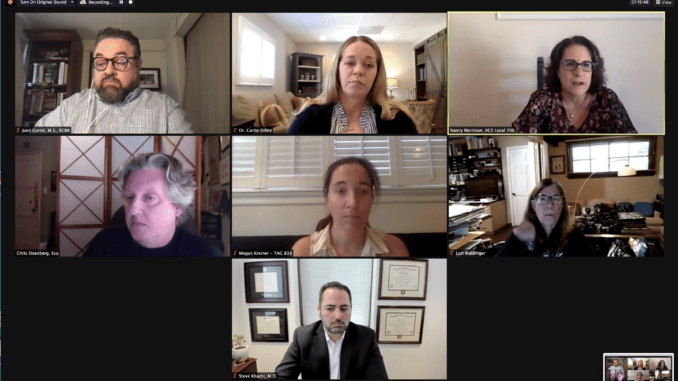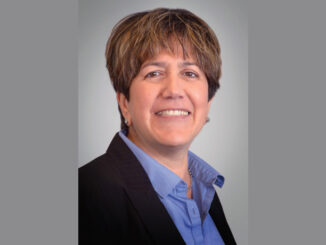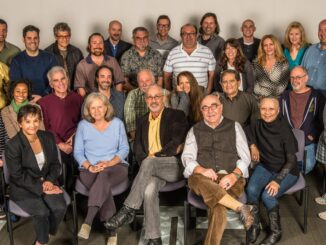
By Su Fang Tham
The women’s and family committees of various IATSE guilds have long wanted to organize shared events that would benefit members across the 13 Hollywood guilds.
Last year, production designer Miranda Cristofani and board member of the Art Directors Guild Local 800 contacted MPEG National Executive Director Cathy Repola and Women’s Steering Committee (“WSC”) Co-Chair Dorian Harris, ACE to discuss possible ideas. After months of planning, the first such collaboration bore fruit Feb. 21, with the panel “Brain Work: Industry Parents on Raising the Neurodiverse Child.”
A panel of clinicians, special education advocates and psychologists shared valuable insights with more than 70 participants who joined the two-hour discussion on how parents can best navigate the various support systems when it comes to raising children with autism spectrum disorder and other neurodiversities.
What many parents may not know, however, is that these neurodiverse conditions may not always be due to genetics or natural factors. Although minuscule, there could be a chance that a condition such as this is the result of medical negligence during pregnancy treatments or birth. If such is the case, then getting in touch with expert medical malpractice attorneys here could help parents determine whether a case for the same can be built; acquiring the necessary compensation in this situation could help parents cope with many of the financial aspects that comes with raising a child.
Besides that, parents often require ample support to ensure that they are providing for their child and doing their best to figure out the nuances that come with raising a child with special needs.
Production designer Denise Pizzini – representing the Art Directors Guild Local 800’s women’s committee – hopes this will be the first of many such collaborative efforts.
“One of our goals at Local 800 is to unite the IATSE Hollywood Women’s Committees,” she said. “We’re all part of the same community and face the same issues. I want to thank all the women who worked really hard to organize this amazing event. And a special shout out to the women’s committees of the Editors Guild and the Animation Guild.” [The Animation Guild was in fact represented through its Family and Membership Committee. — ed.]
Before jumping into the nitty-gritty, co-moderator Nancy Morrison, ACE, of MPEG’s Women’s Steering Committee, brought up a very relevant feature documentary to the topic at hand. In the 2016 coming-of-age story “Life, Animated,” a non-verbal autistic boy named Owen – who is a huge fan of Disney animated films – encounters a breakthrough when his dad was able to communicate with him as his favorite Disney characters.
Co-moderator and animation artist Megan Kreiner (of Animation Guild Local 839) – whose son was diagnosed at age four – found the film especially poignant due to her profession. “It was a hopeful and delightful experience to see an artform that my colleagues are so passionate about become an instrument that helps a child make sense of their world,” she said.
After sharing a similar story (one of the children she treated once communicated with her via Pixar characters), licensed clinical psychologist Carrie Dilley, PhD. – owner of private psychology practice Synergy Psychological – emphasized the importance of early intervention. “A neuropsychological evaluation is the most comprehensive evaluation to determine what’s going on from a cognitive standpoint,” Dilley said. “However, a thorough evaluation can’t be done until the child is over six or seven years old.”
Once the appropriate diagnosis is obtained, parents often have to trudge through a maze in navigating the school systems, medical professionals and insurance coverage, all of which have their own set of convoluted lingo and acronyms. For example, in California, the IEP (Individualized Education Program) is up for re-evaluation every three years, and if the parents have any concerns, they have the right to request a reassessment via an IEE (Independent Educational Evaluation).
Kreiner also wanted to know whether IEPs are intended to support the gifted side of the child that often comes with an autism spectrum diagnosis. Veteran advocate and educational consultant Lori Waldinger has spent years advocating for students’ rights to secure appropriate educational services and helping parents navigate the school system. The majority of autistic children experience learning difficulties. If the parents believe their child might benefit from attending a school that focuses on dyslexia, they should look into institutions like Sage School (https://www.sageschool.net/) or other similar ones.
“It is very important that parents advocate for the unique needs of the child, so the IEP should account for the deficits as well as the strengths,” she emphasized. Taking a holistic approach when it comes to the IEP, she looks at the broader definition of its direct goal – academic performance – which should rightly include social, recreational and any other aspects of life that could impact the child’s overall education.
One of the questions from the participants surrounds the rights that neurodiverse children and their parents have when it comes to education. Special Education attorney Chris Eisenberg, Esq. – whose 17-year-old son was diagnosed with autism at the age of two – reminded the group that all neurodiverse children have the right to a Free Appropriate Public Education in the least restrictive environment, or better known as FAPE. In order to be eligible for an IEP, the child has to meet one of 13 specific disabilities and has a proven need for special education services. When it comes to one of the main differences between an IEP and a Section 504 Plan, he clarifies: “The IEP is specifically for special education services, whereas the Section 504 Plan is for accommodations and modifications.”
With 13 years of experience working with children with special needs, Juan Corral, MS., BCBA focuses on parent empowerment by arming them with information to navigate the IEP process through the school system, amongst other things. So what’s a family to do when their insurance plan denies coverage for services? “The first thing is to get in touch with a regional center [part of California’s system to provide support for individuals with developmental disabilities]. Their job is to help you seek coverage for services,” Corral advised.
However, there are 21 regional centers in the state and they don’t all provide the same services. Moreover, you might be eligible for services under one center but not at another. Even with a diagnosis, you may not qualify for assistance at these regional centers. “One of the eligibility tests is for a child to prove that challenges exist in at least three of these six categories: communication, learning, self-care, mobility, self-direction and capacity for independent living (economic self-sufficiency).” Corral said.
Specializing in psychiatric diagnostic evaluations at the Mind Study Center – a Los Angeles-based clinic providing evidence-based integrated care – Dr. Steve Khachi, M.D. is a physician who focuses on psychopharmacology and neurosciences. Once the initial autism spectrum diagnosis has been determined and spectrum-related services have been secured, he advises parents to consider engaging a psychiatrist or developmental behavioral pediatrician. “These specialists will consider other physiological, biological and genetic factors to rule out any medical condition that may not have been explored,” Dr. Khachi said.
Despite how frustrating the process almost always is, Waldinger offered parents some hope: that better days are ahead. Going back to the documentary, she reminded the group that just as it was the parents who finally unlocked the puzzle for Owen, parents continue to be the driving force in pushing for positive change in this area, including changing laws to benefit neurodiverse students. “Having been in this field for 40 years, I’ve seen the positive trajectory of change in special needs education. Now we have so many more programs and support for these kids. Parents have really taken on a revolution to protect their children. We’ve come light years from where we were in terms of supporting and including ALL students in society.”
With this first event in the rearview mirror, the WSC aims to continue working with other guilds in offering more events in the coming months that will be open to all guild members across the 13 Hollywood Locals.
Looking for Resources About Neurodiversity? Start Here:
Slide deck for “Brain Work: Industry Parents on Raising the Neurodiverse Child” event with panelist bios and other resources
Neurodiversity event on demand
Petition to change MPIPHP coverage
If you wish to connect with other parents outside of this event
The National Clearinghouse on Autism Evidence & Practice /
Autism Society of Los Angeles
Disability Rights California – Regional Center Services
Special Education rights and rersponsibilities (SERR) /
Lanterman Act
Modules explaining practices or strategies w treatment for ASD Children
Special Education rights and rersponsibilities (SERR)
ADHD books and resources
ADHD magazine, community & website
Interactive education tool on learning differences
FMLA Leave for Special Education Meetings
COPAA parent advocate and attorney website
Special education law and advocacy
The Help Group






